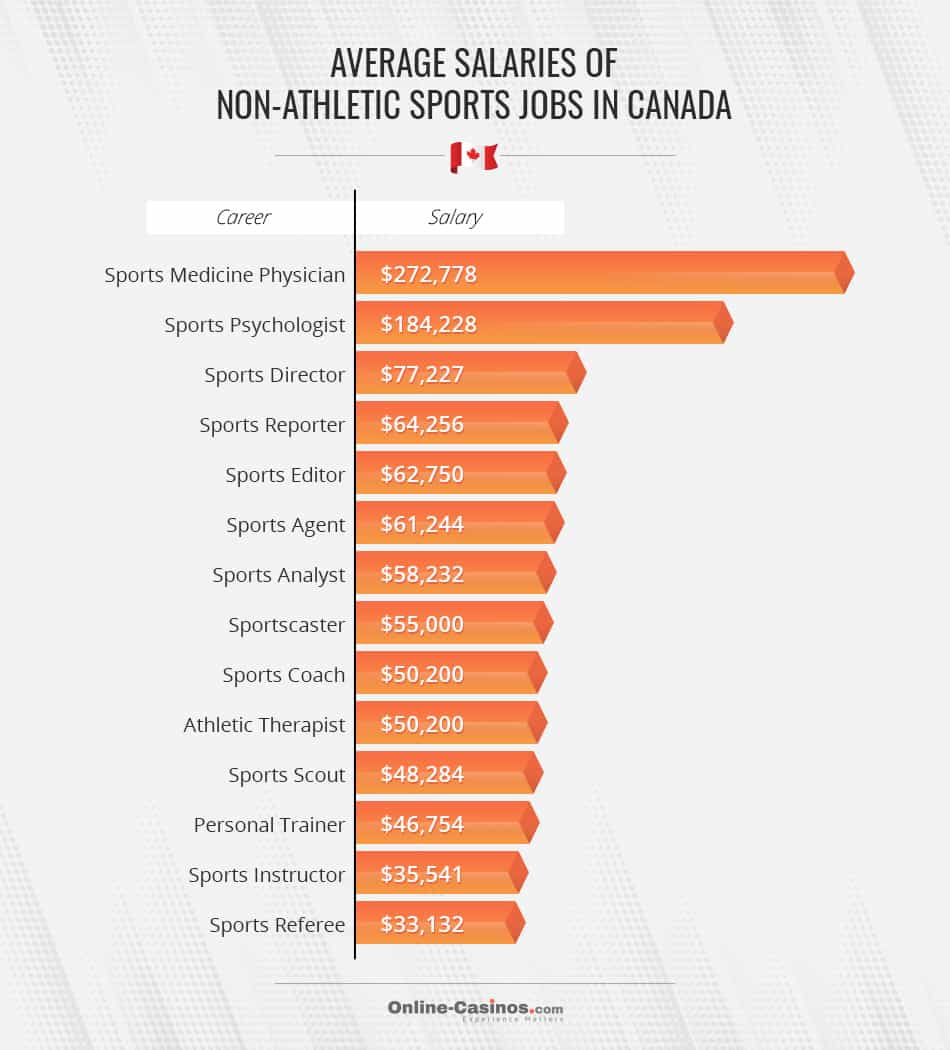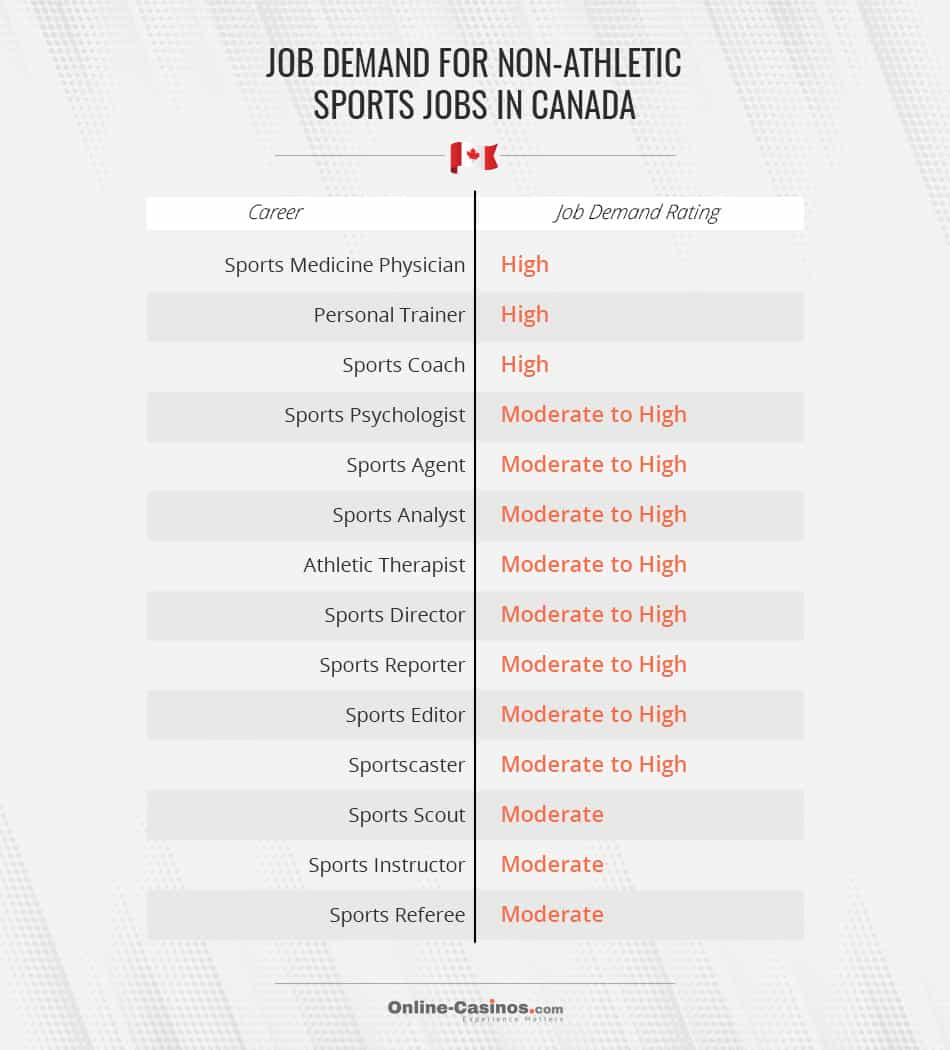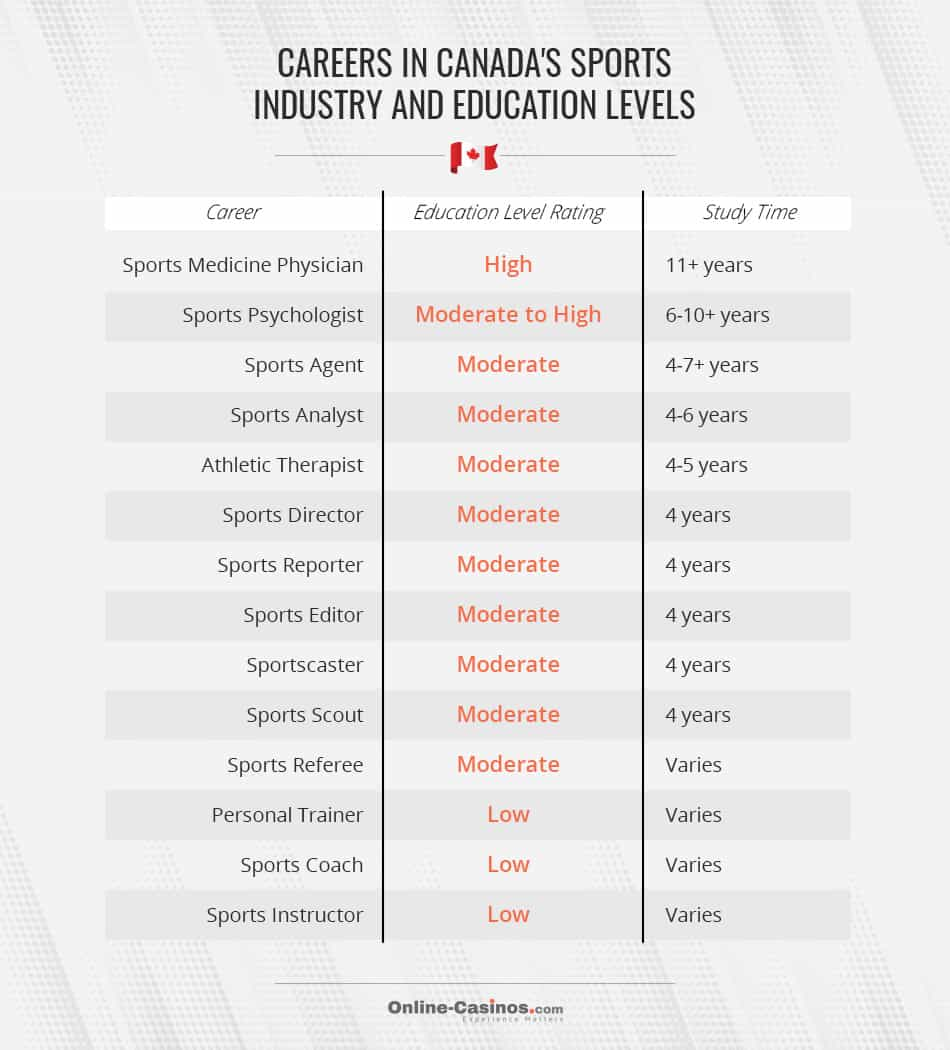Study: Canada’s Most Prominent Sports Careers for Non-Athletes
Sports enthusiasts often dream of a career on the field, but there are numerous exciting opportunities off the court as well. Canada offers a plethora of non-athletic sports careers that combine a passion for sports with professional success. These careers play a vital role in the sports industry, supporting athletes, teams, and organizations in achieving their goals. This article delves into some of Canada’s best careers in sports for non-athletes, highlighting their responsibilities, skills, education, salary, job demand, and more.
Salary Comparison of Sports Careers for Non-Athletes in Canada

When comparing the average salary of non-athletic sports jobs in Canada, it becomes evident that sports physicians earn the highest salary among the listed professions. With an average salary of $272,778, they outpace the other careers significantly. Next at bat is the sports psychologist with an average salary of $184,228, demonstrating a notable difference between the two medicine-based professions and the rest of the sports-related careers. The salaries gradually decrease from there, with directors earning an average of $77,227, reporters $64,256, and editors earning $62,750. While these careers still offer competitive salaries, they fall short compared to the earnings of medical professionals in the sports industry.
Job Demand for Non-Athletic Sports Jobs in Canada

Certain non-athletic sports careers in Canada, such as doctors and psychologists, experience high job demand due to their crucial roles in athlete health and mental well-being. Agents and analysts also enjoy high demand for their contract negotiation and data-driven insights. Meanwhile, roles like directors, reporters, and editors have moderate demand, with competition in traditional media outlets. Coaches, scouts, instructors and referees are in variable demand, depending on a number of factors, including location, the popularity of the sport and the skill or experience of the individual.
Education Level and Study Time for Sports Careers in Canada

The Educational Level Rating provides an overview of the level of challenge typically associated with becoming eligible to practice a particular job. The ratings take into account factors such as the level of education, specialized training, professional certifications, competition, and industry demands.
This data offers a comprehensive understanding of the challenges and commitment required to pursue different sports careers. By considering the study time needed for each profession, we gain further insight into the investment of time and effort required to become eligible in these fields.
It is apparent that careers such as Sports Medicine Physician and Sports Psychologist, which received a “High” education level, demand not only extensive involvement but also significant study time. These professions typically require 11+ years of education, including a bachelor’s degree, medical school, residency, and additional specialization in sports medicine or psychology. The long duration of study underscores the depth of knowledge and expertise necessary to excel in these fields.
On the other hand, careers like personal trainer, sports coach, and sports instructor, which received a “low” difficulty rating, have varied study time requirements. The study time for these roles can vary greatly, depending on the specific certifications, courses, or diploma programs pursued by individuals. However, relative to other careers, these roles often have a shorter study duration, allowing individuals to enter the field more quickly.
Moderate difficulty careers, such as sports agent, sports analyst, and sports reporter, fall in between, requiring a moderate amount of study time to gain the necessary knowledge and skills. These professions typically involve completing a bachelor’s degree, which usually takes around four years of study.
Highest Paid Sports Jobs in Canada for Non-Athletes
1. Sports Medicine Physician
A sports physician specializes in diagnosing and treating sports-related injuries and conditions, helping athletes recover and optimize their performance. They have extensive knowledge of sports physiology, musculoskeletal health, and rehabilitation techniques. Their expertise enables them to develop personalized treatment plans, including rehabilitation exercises, medication, and therapy, to ensure athletes can safely return to their sport.
Responsibilities:
- Diagnosing and treating sports-related injuries
- Designing and implementing rehabilitation programs
- Collaborating with coaches and trainers to optimize athletes’ performance
- Conducting pre-participation physical examinations
Skills and competencies:
- Comprehensive knowledge of sports injuries and their treatment
- Excellent diagnostic and problem-solving skills
- Strong communication and interpersonal skills
- Ability to work well under pressure
Education:
To become a sports medicine physician, one must complete a medical degree, followed by a residency program specializing in sports medicine. Additional certifications and fellowships are also beneficial for career advancement.
Job opportunities and development:
Sports medicine physicians can work in hospitals, sports clinics, or as part of professional sports teams. There are opportunities to specialize in a particular sport or advance to higher-level positions, such as becoming the team physician for a national sports team.
Salary:
The average salary for a sports medicine physician in Canada is $272,778, making it one of the highest-paying sports jobs for non-athletes.
Job demand:
The demand for sports medicine physicians is expected to remain strong due to the growing emphasis on athlete health and injury prevention. As sports participation and awareness increase, there is a continued need for qualified professionals in this field.
Pros and Cons:
Pros:
- Opportunity to work closely with athletes and contribute to their well-being
- Potential for financial stability
- Continual learning and staying up to date with the latest advancements in sports medicine
Cons:
- High-pressure situations, especially during critical injuries
- Long working hours, including evenings and weekends
Who it fits and who it may not:
Sports medicine physicians are well-suited for individuals who have a passion for medicine and sports. They should possess strong analytical skills, empathy, and the ability to thrive in high-pressure environments. However, those seeking a strictly nine-to-five schedule might find the demands of this career challenging.
2. Sports Psychologist
A sports psychologist is a professional who specializes in the mental and emotional aspects of sports performance. They work with athletes to enhance their mental resilience, motivation, and overall well-being. Sports psychologists employ various techniques, such as visualization, goal setting, and stress management, to help athletes improve their focus, confidence, and performance.
Responsibilities:
- Assessing and addressing psychological factors affecting athletes’ performance
- Providing counseling and therapy to athletes
- Developing mental strategies to enhance performance and manage stress
- Collaborating with coaches and trainers to create a positive team environment
Skills and competencies:
- Expertise in sports psychology and mental health
- Strong counseling and interpersonal skills
- Empathy and the ability to connect with athletes
- Excellent communication and presentation skills
Education:
A Sports psychologist typically holds a master’s or doctoral degree in psychology, with specialization in sports psychology. Practical experience through internships and supervised practice is also valuable.
Job opportunities and development:
Sports psychologists can work with professional sports teams, sports academies, or as independent consultants. There are opportunities to specialize in specific sports or work with athletes of different levels, from amateur to elite.
Salary:
The average salary for a Sports Psychologist in Canada is $184,228.
Job demand:
The demand for sports psychologists is on the rise as athletes recognize the importance of mental well-being in sports performance. The field is expected to experience steady growth as more athletes and sports organizations prioritize mental health and seek professional support.
Pros and Cons:
Pros:
- The opportunity to make a positive impact on athletes’ mental well-being and performance
- Flexibility to work with athletes from various sports
- Constant learning and applying new techniques in sports psychology
Cons:
- The emotional toll of dealing with athletes’ psychological challenges
- Working irregular hours, including weekends and evenings to accommodate athletes’ schedules
Who it fits and who it may not:
Individuals who have a strong background in psychology, a passion for sports, and exceptional interpersonal skills are well-suited for a career as a sports psychologist. Those who thrive on helping others overcome mental obstacles and are comfortable working irregular hours will find fulfillment in this profession.
3. Sports Director
A sports director is an individual who oversees and manages the operations of sports programs or organizations. They are responsible for coordinating and organizing various aspects of sports activities, including scheduling events, managing budgets, and ensuring the smooth functioning of the sports department. Sports directors often work closely with coaches, athletes, and administrative staff to ensure that sports programs are executed effectively. They play a vital role in providing strategic direction, setting goals, and creating a positive environment for athletes and participants.
Responsibilities:
- Developing and implementing strategic plans for sports organizations
- Managing budgets, resources, and staff
- Overseeing event planning and coordination
- Establishing partnerships and sponsorships
Skills and competencies:
- Strong leadership and organizational skills
- Excellent communication and negotiation abilities
- Financial management and budgeting expertise
- Knowledge of sports administration and governance
Education:
A Sports Director typically holds a bachelor’s or master’s degree in sports management, business administration, or a related field. Practical experience through internships or volunteer work in sports organizations is highly beneficial.
Job opportunities and development:
Sports Directors can work in various settings, including professional sports organizations, amateur sports associations, and community sports programs. There are opportunities for career growth, including taking on higher-level positions within larger sports organizations.
Salary:
The average salary for a Sports Director in Canada is $77,227.
Job demand:
The demand for sports directors can vary depending on the size and scope of sports programs and organizations. Larger organizations and professional sports teams often have a greater need for experienced sports directors, while smaller organizations may have limited opportunities.
Pros and Cons:
Pros:
- The opportunity to shape and develop sports programs and initiatives
- Working with a diverse range of stakeholders, including athletes, coaches, and community members
- The potential to create positive and impactful change in the sports community
Cons:
- High-pressure environment with demanding responsibilities
- Irregular working hours, including evenings and weekends during events
Who it fits and who it may not:
Individuals with strong leadership skills, a passion for sports administration, and the ability to multitask effectively are well-suited for a career as a sports director. Those who thrive in dynamic and fast-paced environments, enjoy managing teams and resources, and have a strategic mindset will excel in this role. However, individuals seeking a strictly nine-to-five schedule may find the irregular hours challenging.
4. Sports Reporter
A sports reporter is a journalist who covers sports events, providing news coverage, analysis, and commentary to inform and engage sports enthusiasts. They attend sporting events, conduct interviews with athletes, coaches, and other relevant figures, and gather information to create news articles, reports, and broadcasts. Sports reporters play a crucial role in delivering up-to-date information, sharing game highlights, and providing insights into teams, players, and sports trends.
Responsibilities:
- Researching and reporting on sports events, athletes, and teams
- Conducting interviews with athletes, coaches, and sports personalities
- Writing articles, features, and news stories
- Providing live coverage and commentary during sports events
Skills and competencies:
- Strong writing and communication skills
- Knowledge of sports and understanding of journalistic principles
- Ability to meet deadlines and work under pressure
- Excellent interviewing and research abilities
Education:
While a specific degree in journalism or communications is not always required, a bachelor’s degree in a related field can be advantageous. Practical experience through internships, writing for student publications, or working for local media outlets is highly beneficial.
Job opportunities and development:
Sports Reporters can work for newspapers, magazines, online publications, television networks, or radio stations. There are opportunities for career advancement, including becoming a sports editor, sports anchor, or transitioning into sports broadcasting.
Salary:
The average salary for a Sports Reporter in Canada is $64,256.
Job demand:
The job growth for sports reporters is relatively stable, with opportunities available in traditional media outlets as well as digital platforms. However, the field is highly competitive, and candidates with multimedia skills and versatility have an advantage in securing positions.
Pros and Cons:
Pros:
- The opportunity to witness and report on exciting sports events and stories
- Interacting with athletes, coaches, and other sports professionals
- Contributing to the sports media landscape and informing sports enthusiasts
Cons:
- Meeting tight deadlines, especially during live events
- Working irregular hours, including evenings and weekends
Who it fits and who it may not:
Individuals with a passion for both sports and journalism, excellent writing and communication skills, and the ability to thrive in fast-paced environments are well-suited for a career as a sports reporter. Those who enjoy the thrill of reporting breaking news and connecting with the sports community will find fulfillment in this profession. However, individuals who prefer a structured and predictable work schedule may find the irregular hours challenging.
5. Sports Editor
A sports editor is a key figure in the world of journalism who is responsible for overseeing and managing sports-related content. Their role involves selecting, editing, and curating sports news stories, articles, and features for publication. Sports editors work closely with reporters and writers to ensure that the content meets journalistic standards, is accurate, and engages readers.
Responsibilities:
- Managing a team of writers, reporters, and contributors
- Assigning and editing sports articles and stories
- Ensuring accuracy, quality, and adherence to editorial standards
- Collaborating with other departments, such as design and photography
Skills and competencies:
- Strong editing and proofreading skills
- Excellent organizational and project management abilities
- Knowledge of sports and understanding of editorial principles
- Ability to work under pressure and meet deadlines
Education:
A Sports editor typically holds a bachelor’s degree in journalism, communications, or a related field. Practical experience through internships, working for student publications, or gaining experience in the media industry is highly beneficial.
Job opportunities and development:
Sports editors can work for newspapers, magazines, online publications, or broadcast networks. There are opportunities for career advancement, including senior editorial positions, managing larger teams, or taking on broader editorial responsibilities.
Salary:
The average salary for a Sports Editor in Canada is $62,750.
Job demand:
The demand for sports editors is influenced by the overall demand for sports journalism. With the shift towards digital media, sports editors who possess strong editing skills for various content formats (text, video, and multimedia) are in higher demand.
Pros and Cons:
Pros:
- The opportunity to shape and curate sports content
- Working with a team of talented writers and contributors
- Contributing to the sports media landscape and informing sports enthusiasts
Cons:
- Meeting tight deadlines and managing multiple projects simultaneously
- Working irregular hours, especially during major sports events
Who it fits and who it may not:
Individuals with a strong editorial background, a deep knowledge and passion for sports, and excellent organizational and leadership skills are well-suited for a career as a Sports Editor. Those who enjoy shaping and curating sports content, collaborating with writers and contributors, and staying up to date with the sports industry will find fulfillment in this profession. However, individuals who prefer a structured and predictable work schedule may find the irregular hours and deadline pressures challenging.
6. Sports Agent
A sports agent is a professional who represents and negotiates contracts on behalf of athletes. Their primary role is to advocate for their clients’ best interests, both financially and professionally. Sports agents work closely with athletes to secure lucrative deals for contracts, endorsement agreements, and other business opportunities. They provide guidance and advice on career decisions, such as team selection, contract terms, and branding opportunities.
Responsibilities:
- Negotiating contracts and endorsement deals for athletes
- Managing athletes’ career and financial interests
- Building relationships with teams, sponsors, and other industry professionals
- Providing guidance and support to athletes
Skills and competencies:
- Strong negotiation and networking skills
- Excellent communication and interpersonal abilities
- Business and financial acumen
- Knowledge of sports industry regulations and trends
Education:
A sports agent typically holds a bachelor’s or master’s degree in sports management, business administration, or a related field. Gaining practical experience through internships or working with established sports agencies is highly beneficial.
Job opportunities and development:
Sports agents can work independently or for sports agencies that represent multiple athletes. There are opportunities for career growth, including representing high-profile athletes, specializing in a particular sport, or establishing their own sports agency.
Salary:
The average salary for a Sports Agent in Canada is $61,244.
Job demand:
The demand for sports agents is tied to the growth of the sports industry and the need for professional representation. As the sports industry expands, the demand for qualified sports agents to negotiate contracts and manage athletes’ careers is expected to continue.
Pros and Cons:
Pros:
- The opportunity to work closely with professional athletes
- The potential for substantial earnings through contract negotiations and endorsements
- Building relationships within the sports industry
Cons:
- Highly competitive industry with a limited number of high-profile clients
- Long working hours, including evenings and weekends
- Dealing with high-pressure negotiations and managing client expectations
Who it fits and who it may not:
Individuals with strong negotiation skills, business acumen, and a passion for sports are well-suited for a career as a sports agent. Those who enjoy building relationships, thrive in competitive environments, and have a deep understanding of the sports industry will excel in this role. However, individuals who prefer a more traditional nine-to-five work schedule may find the irregular hours and demands of client management challenging.
7. Sports Analyst
A sports analyst is an individual who provides expert insights and analysis on sports events, teams, and players. They utilize their knowledge and expertise to evaluate performance, strategies, and trends in various sports. Sports analysts often use statistical data, video footage, and their understanding of the game to provide valuable commentary and predictions. They play a significant role in enhancing the understanding and enjoyment of sports for viewers and fans.
Responsibilities:
- Analyzing sports events, performances, and strategies
- Providing insights and commentary for media outlets
- Creating statistical models and using data analysis tools
- Evaluating player and team performance
Skills and competencies:
- Strong analytical and critical thinking abilities
- Excellent communication and presentation skills
- Deep knowledge and understanding of various sports
- Proficiency in statistical analysis and data visualization
Education:
A sports analyst typically holds a bachelor’s or master’s degree in statistics, sports science, or a related field. Strong analytical and data interpretation skills are essential, and experience with data analysis software and statistical modeling techniques is highly beneficial.
Job opportunities and development:
Sports analysts can work for media outlets, sports organizations, or as independent consultants. There are opportunities for career advancement, including specializing in specific sports, becoming a lead analyst, or transitioning into sports data analytics.
Salary:
The average salary for a sports analyst in Canada is $58,232.
Job demand:
The demand for sports analysts is driven by the growing interest in data-driven insights and performance analysis. As sports teams and media outlets increasingly rely on data analytics, the demand for skilled sports analysts who can provide in-depth analysis is expected to rise.
Pros and Cons:
Pros:
- The opportunity to provide expert analysis and insights in the sports industry
- Contributing to sports media and helping fans understand the game
- Working with data and utilizing statistical models
Cons:
- Meeting tight deadlines, especially during live events
- Working irregular hours, including evenings and weekends
- Constantly staying updated with the latest sports trends and developments
Who it fits and who it may not:
Individuals with a strong passion for sports, exceptional analytical skills, and the ability to interpret data and trends are well-suited for a career as a sports analyst. Those who enjoy providing expert analysis and insights, have a deep understanding of various sports, and can effectively communicate complex information will excel in this role. However, individuals who prefer a structured and predictable work schedule may find the irregular hours and the constant need to stay updated challenging.
8. Sportscaster
A sportscaster is a media professional who provides live commentary and analysis during sports broadcasts. Their role is to deliver real-time updates, play-by-play descriptions, and expert insights to engage and inform viewers or listeners. Sportscasters possess in-depth knowledge of the sport they are covering and use their communication skills to provide a dynamic and engaging broadcast experience.
Responsibilities:
- Providing live commentary and analysis during sports events
- Conducting pre- and post-game interviews
- Researching and preparing talking points and statistics
- Collaborating with production teams and other broadcasters
Skills and competencies:
- Strong verbal communication and public speaking abilities
- Deep knowledge and understanding of various sports
- Ability to think quickly and provide insightful analysis
- Comfortable working in front of a camera or microphone
Education:
While a specific degree is not always required, a bachelor’s degree in journalism, broadcasting, or a related field can be advantageous. Practical experience through internships, working for student media outlets, or gaining experience in broadcasting is highly beneficial.
Job opportunities and development:
Sportscasters can work for television networks, radio stations, or online streaming platforms. There are opportunities for career advancement, including hosting sports shows, covering major sports events, or becoming a lead sportscaster.
Salary:
The average salary for a Sportscaster in Canada is $55,000.
Job demand:
The demand for sportscasters remains steady, with opportunities available in television, radio, and online platforms. However, the field is competitive, and candidates with strong communication skills, sports knowledge, and on-air presence have better prospects.
Pros and Cons:
Pros:
- The opportunity to be the voice of sports events and engage with audiences
- Working in a dynamic and exciting live broadcasting environment
- Building a strong presence and reputation in the sports media industry
Cons:
- Working irregular hours, including evenings, weekends, and holidays
- Handling the pressure of live broadcasting and providing instant analysis
- Traveling to cover sports events, which can involve time away from home
Who it fits and who it may not:
Individuals with a passion for sports, exceptional communication skills, and the ability to think on their feet are well-suited for a career as a sportscaster. Those who enjoy being in front of a camera or microphone, thrive in live broadcasting environments, and can provide engaging and insightful commentary will excel in this role. However, individuals who prefer a structured and predictable work schedule may find the irregular hours and the pressure of live broadcasting challenging.
9. Sports Coach
A sports coach is a vital figure in the world of athletics, responsible for training and guiding athletes to reach their full potential. The role of a sports coach extends beyond teaching the technical skills of a particular sport. They inspire, motivate, and mentor athletes, helping them develop discipline, teamwork, and sportsmanship. Coaches design and implement training programs, analyze performance, and provide constructive feedback to improve skills and strategies.
Responsibilities:
- Designing training programs and practice sessions
- Teaching and demonstrating sports techniques and tactics
- Evaluating and providing feedback on athletes’ performance
- Developing game strategies and analyzing opponents
Skills and competencies:
- Deep knowledge and expertise in a specific sport
- Strong leadership and communication skills
- Ability to motivate and inspire athletes
- Understanding of sports psychology and injury prevention
Education:
A sports coach typically needs a combination of playing experience, coaching certifications, and educational background in sports science, physical education, or a related field. Specialized coaching certifications and ongoing professional development are highly beneficial.
Job opportunities and development:
Sports coaches can work at various levels, including youth, high school, college, and professional teams. There are opportunities for career growth, such as becoming a head coach, coaching at higher-level teams or national programs, or specializing in specific areas, such as strength and conditioning or sports nutrition.
Salary:
The average salary for a Sports Coach in Canada is $50,200.
Job demand:
The demand for sports coaches varies based on the sport and level of competition. High-profile sports and elite levels often have more competitive coaching opportunities, while community and recreational sports offer broader coaching roles.
Pros and Cons:
Pros:
- The opportunity to make a significant impact on athletes’ development and success
- Building meaningful relationships with athletes and fellow coaches
- Working in a dynamic and competitive sports environment
Cons:
- Long hours, including evenings, weekends, and travel for competitions
- Dealing with the pressure of performance expectations and achieving results
- Constantly adapting to new coaching methodologies and strategies
Who it fits and who it may not:
Individuals with a deep passion for a specific sport, strong leadership skills, and a desire to mentor and develop athletes are well-suited for a career as a sports coach. Those who enjoy the process of teaching and guiding athletes, have a thorough understanding of the sport, and can effectively communicate and motivate will excel in this role. However, individuals who prefer a more traditional nine-to-five work schedule and are not comfortable with the demands of coaching and managing athletes may find this career challenging.
10. Athletic Therapist
An athletic therapist is a professional who specializes in preventing, assessing, and treating musculoskeletal injuries in athletes. They play a crucial role in the field of sports medicine, providing immediate care and rehabilitation services to athletes. Their expertise extends to injury prevention and providing education on proper training techniques and conditioning exercises. Athletic therapists are often found on the sidelines of sporting events, ready to provide immediate medical attention and support to athletes.
Responsibilities:
- Evaluating and diagnosing sports injuries
- Developing and implementing treatment and rehabilitation plans
- Providing immediate care and emergency management on the field
- Collaborating with other healthcare professionals
Skills and competencies:
- Strong knowledge of anatomy, physiology, and sports injuries
- Excellent assessment and diagnostic skills
- Proficiency in therapeutic modalities and rehabilitation exercises
- Ability to work well under pressure and handle emergencies
Education:
An athletic eherapist typically holds a bachelor’s degree in kinesiology, sports medicine, or a related field. Additional certifications, such as Certified Athletic Therapist (CAT) or Certified Strength and Conditioning Specialist (CSCS), are highly beneficial. Practical experience through internships or clinical placements is also important.
Job opportunities and development:
Athletic therapists can work in various settings, including sports teams, clinics, rehabilitation centers, and universities. There are opportunities for specialization in specific sports or areas of expertise, such as orthopedics or concussion management. Continuing education and staying updated with the latest research and techniques are essential for professional development.
Salary:
The average salary for an athletic therapist in Canada is $50,200.
Job demand:
The demand for athletic therapists is influenced by the need for injury prevention and rehabilitation services in sports. As awareness of the importance of sports injury management grows, the demand for qualified athletic therapists is expected to increase.
Pros and Cons:
Pros:
- The opportunity to help athletes recover from injuries and return to sports
- Working closely with athletes and other healthcare professionals
- Being involved in the dynamic and evolving field of sports medicine
Cons:
- Dealing with the pressure of managing injuries and making quick decisions
- Working irregular hours, including evenings, weekends, and travel
- Being exposed to physically demanding situations and potential injuries
Who it fits and who it may not:
Individuals with a strong passion for sports, a keen interest in injury management, and the ability to work well under pressure are well-suited for a career as an athletic therapist. Those who enjoy working in a collaborative healthcare team, have excellent assessment and treatment skills, and are committed to ongoing professional development will excel in this role. However, individuals who are not comfortable with the demands of working in physically challenging situations or managing time-sensitive injury cases may find this career challenging.
11. Sports Scout
A sports scout is an individual who identifies and evaluates talented athletes for recruitment by sports teams or organizations. They are responsible for scouting and assessing athletes’ skills, performance, potential, and suitability for specific roles within a team. Sports scouts attend games, tournaments, and other sporting events to observe athletes in action, analyze their abilities, and gather information about their athletic capabilities. They closely track the performance and progress of potential recruits, compiling detailed reports and providing recommendations to team management.
Responsibilities:
- Identifying talented athletes through scouting and talent evaluation
- Attending games, competitions, and tournaments to assess players
- Preparing scouting reports and player profiles
- Liaising with coaches, agents, and team management
Skills and competencies:
- Strong knowledge of the specific sport and its player requirements
- Excellent observation and evaluation skills
- Ability to analyze player performance and potential
- Effective communication and negotiation abilities
Education:
A specific degree is not always required, but a background in sports management, physical education, or a related field can be beneficial. Practical experience in scouting, working with sports teams, or playing the sport at a competitive level is advantageous.
Job opportunities and development:
Sports scouts can work for professional sports teams, college programs, talent agencies, or player representation firms. There are opportunities for career advancement, such as becoming a head scout or specializing in a particular sport or player position. Building a strong network within the sports industry is essential for professional development.
Salary:
The average salary for a sports scout in Canada is $48,284.
Job demand:
The demand for sports scouts is primarily driven by professional sports teams and organizations looking to identify talent for recruitment. The demand can fluctuate based on team budgets, scouting strategies, and changes in the sports industry.
Pros and Cons:
Pros:
- The opportunity to discover and nurture talented athletes
- Working in a dynamic and exciting sports environment
- Building a reputation and network within the sports industry
Cons:
- Traveling extensively to attend games and tournaments
- Dealing with the pressure of identifying top talent and making critical decisions
- Competing with other scouts and talent evaluators
Who it fits and who it may not:
Individuals with a deep passion for a specific sport, strong observational skills, and an eye for talent are well-suited for a career as a sports scout. Those who enjoy traveling, have a good understanding of player requirements, and can effectively communicate their evaluations will excel in this role. However, individuals who prefer a more structured and office-based work environment or have difficulty making critical judgments about player potential may find this career challenging.
12. Personal Trainer
A personal trainer is a fitness professional who works closely with individuals to design and implement personalized fitness programs. They provide guidance, motivation, and support to help clients achieve their health and fitness goals. Personal trainers assess clients’ fitness levels, create customized workout plans, and provide instruction on proper exercise techniques. They also offer advice on nutrition, lifestyle changes, and overall wellness.
Responsibilities:
- Conducting fitness assessments and goal setting with clients
- Designing personalized exercise programs
- Providing instruction and demonstration of proper exercise techniques
- Motivating and supporting clients throughout their fitness journey
Skills and competencies:
- Strong knowledge of exercise physiology and fitness principles
- Excellent communication and interpersonal skills
- Ability to motivate and inspire clients
- Knowledge of injury prevention and safe exercise practices
Education:
A personal trainer typically holds a certification from a recognized fitness organization, such as the Canadian Society for Exercise Physiology (CSEP) or the National Strength and Conditioning Association (NSCA). Additional certifications in specialized areas, such as group fitness or nutrition, can enhance career prospects. Practical experience through internships or working in fitness facilities is also valuable.
Job opportunities and development:
Personal trainers can work in various settings, including fitness centers, gyms, corporate wellness programs, or as independent contractors. There are opportunities for specialization, such as working with athletes, older adults, or individuals with specific health conditions. Continuing education and staying updated with the latest fitness trends and research are essential for professional development.
Salary:
The average salary for a personal trainer in Canada is $46,754.
Job demand:
The demand for personal trainers in the sports industry is steady, with opportunities available in fitness centers, sports clubs, and private training facilities. The demand is influenced by individuals’ interest in health and fitness, making it a resilient field.
Pros and Cons:
Pros:
- The opportunity to make a positive impact on clients’ health and well-being
- Flexible work hours and the potential for self-employment
- Working in a dynamic and evolving fitness industry
Cons:
- Dealing with the challenge of client retention and competition
- Working irregular hours, including early mornings, evenings, and weekends
- Constantly adapting programs to meet individual client needs and goals
Who it fits and who it may not:
Individuals with a passion for fitness, a desire to help others, and strong interpersonal skills are well-suited for a career as a personal trainer. Those who enjoy working one-on-one with clients, have a good understanding of exercise principles, and can motivate and inspire individuals to achieve their goals will excel in this role. However, individuals who prefer a more structured and routine-based work environment or lack the ability to connect with and support clients may find this career challenging.
13. Sports Instructor
A sports instructor is an individual who teaches and trains individuals in specific sports or recreational activities. They have expertise in a particular sport and are responsible for imparting technical skills, knowledge, and strategies to their students or participants. Sports instructors play a vital role in guiding and motivating individuals to improve their performance and enjoyment of the sport. They develop lesson plans, conduct training sessions, and provide feedback and guidance to help individuals develop their skills and reach their goals. Sports instructors may work with beginners, intermediate-level athletes, or even professional athletes, depending on their specialization and experience.
Responsibilities:
- Developing and delivering sports lessons and training programs
- Instructing individuals or groups in sports techniques and strategies
- Organizing and supervising sports activities and competitions
- Providing feedback and guidance to improve performance
Skills and competencies:
- Strong knowledge and expertise in the specific sport
- Excellent communication and instructional skills
- Ability to motivate and engage participants
- Understanding of safety protocols and risk management
Education:
A sports instructor may have a background in physical education, kinesiology, or a specific sports-related discipline. Practical experience in the sport, such as playing at a competitive level or coaching, is valuable. Additional certifications or training in coaching and instructional techniques can enhance career prospects.
Job opportunities and development:
Sports instructors can work in various settings, including schools, sports clubs, community centers, and private sports academies. There are opportunities for specialization in specific sports or age groups. Professional development through attending workshops, obtaining advanced certifications, and gaining experience in different instructional settings is important for career growth.
Salary:
The average salary for a Sports Instructor in Canada is $35,541.
Job demand:
The demand for sports instructors can vary depending on the popularity and accessibility of different sports. High-demand sports and specialized training programs tend to offer more opportunities for sports instructors.
Pros and Cons:
Pros:
- The opportunity to share passion and knowledge for a specific sport
- Working with individuals and fostering their skill development
- Being actively involved in sports and physical activities
Cons:
- Dealing with challenges in managing large groups or diverse skill levels
- Working irregular hours, including evenings, weekends, and holidays
- Constantly adapting teaching methods to meet individual or group needs
Who it fits and who it may not:
Individuals with a strong passion for a specific sport, effective communication skills, and a desire to inspire others are well-suited for a career as a sports instructor. Those who enjoy working with individuals or groups, have a good understanding of the sport’s technical aspects, and can create a positive learning environment will excel in this role. However, individuals who prefer a more independent work environment or lack patience and adaptability may find this career challenging.
14. Sports Referee
A sports referee is an essential figure in any sporting event who ensures fair play and enforces the rules and regulations of the game. They have the authority to make impartial decisions on game situations, fouls, penalties, and other infractions. Sports referees maintain order, manage conflicts, and communicate with players, coaches, and officials during the game. They must possess a thorough knowledge of the specific sport and its rules, excellent decision-making skills, and the ability to handle pressure and maintain composure in intense situations.
Responsibilities:
- Officiating sports events and enforcing rules and regulations
- Making objective decisions on game situations, fouls, and penalties
- Communicating with players, coaches, and officials
- Managing conflicts and maintaining order on the field or court
Skills and competencies:
- Thorough knowledge of the specific sport and its rules
- Excellent decision-making and judgment skills
- Strong communication and interpersonal skills
- Ability to handle pressure and maintain composure
Education:
While a specific degree is not required, a deep understanding of the sport and its rules is essential. Many referees gain experience by playing the sport themselves or participating in officiating training programs and workshops. Officiating certification courses offered by sports associations or governing bodies can also enhance career prospects.
Job opportunities and development:
Sports referees can officiate at various levels, including community leagues, school competitions, and professional sports events. Referees can progress to higher levels of competition and may have opportunities to officiate in international events. Continuous learning, attending referee clinics, and gaining experience in different game situations contribute to professional development.
Salary:
The average salary for a Sports Referee in Canada is $33,132.
Job demand:
The demand for sports referees is constant, as organized sports require officiating for fair play. However, the demand can vary based on the sport, level of competition, and regional popularity.
Pros and Cons:
Pros:
- Being involved in the sport and contributing to fair play
- Opportunity to officiate at different levels of competition
- Continuously learning and developing knowledge of the sport
Cons:
- Facing challenging and high-pressure situations
- Dealing with player/coach disagreements and criticism
- Working irregular hours, including evenings, weekends, and holidays
Who it fits and who it may not:
Individuals with a deep passion for a specific sport, a strong understanding of the rules, and the ability to make impartial decisions are well-suited for a career as a sports referee. Those who can handle pressure, effectively communicate, and maintain control in intense game situations will excel in this role. However, individuals who are easily swayed by external influences, have difficulty making quick decisions, or struggle with managing conflicts may find this career challenging.
Sources:



